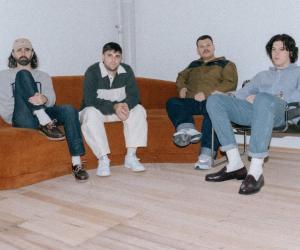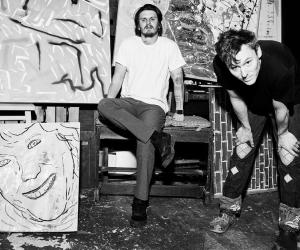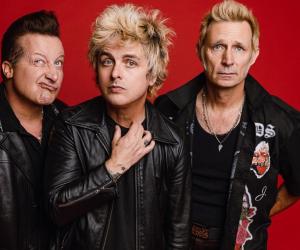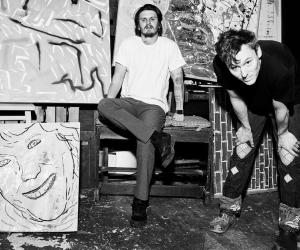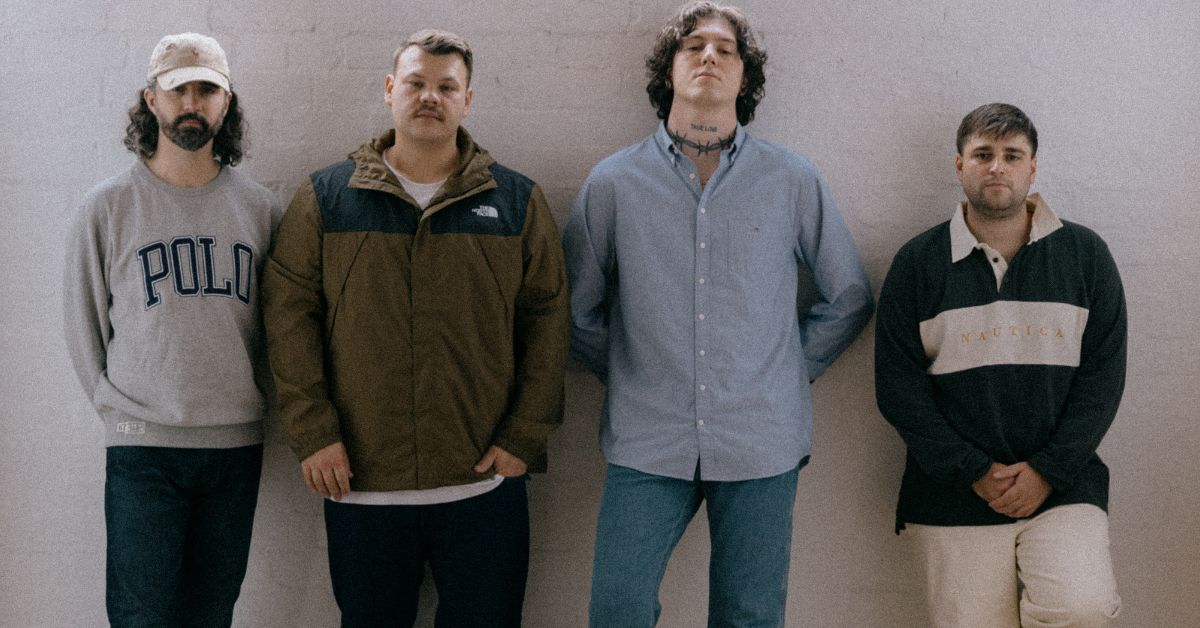
Trophy Eyes released their fourth studio album Suicide and Sunshine on June 23rd via Hopeless Records. The most complete collection of songs the celebrated Newcastle group has ever penned, this musical rumination on the constant contrast of our human existence, was intended to be a farewell. Instead, it is a rebirth. An artistic expression of vocalist John Floreani's life story told in 14 chapters, Suicide and Sunshine is at once the sound of Trophy Eyes' evolution and their salvation.
Inspired by Floreani's musings on Eagles Return a photograph by astronaut Michael Collins who was the Command Module Pilot on Appollo 11, Suicide and Sunshine is a telling of Floreani's life, the good and the bad, the romantic tragedy of the human experience, brought to life in achingly beautiful songcraft by a songwriter, band and production team reaching new heights.
Across the 14 movements, Floreani works through the concepts of home, identity, intergenerational trauma, grief, mental health, regret, addiction, heartbreak, love and gratitude, setting them to the most accomplished, varied and considered instrumental accompaniment of Trophy Eyes career.
In the lead-up to the release of the album, we caught up with the man at the centre of the story, John Floreani to talk about Suicide and Sunshine.
Interview - Talking 'Suicide and Sunshine' with John Floreani of Trophy Eyes
Even for a band as renowned for being raw and honest as Trophy Eyes, these songs are pretty intense. Do you find the further into your career you get, the more comfortable you are discussing these intensely personal matters in a public forum?
"I think so. When I first started out doing this, I'd often try to avoid answering those questions as best I could, and I'd always end up fucking it up.
So I'd be doing an interview on Short.Fast.Loud and I'd get asked 'What's this song about?' and I'd freak out and just blurt it all out on national radio. And I'd be like, 'What have I done?'. I really struggled with talking about it. There are heavy topics in a lot of the songs and I don't really talk about them outside of the press or, or outside of writing them, either. I don't really talk to my friends or my girlfriend or my family about any of this stuff. So it's weird, but yeah, I'm definitely better at it now."
Having listened to Suicide and Sunshine and reading the lyrical notes, it's hard not to be quite struck by the level of writing that these songs contain. Were the lyrics written as prose, say as poems, before you started writing the music to them?
"No. I think that's just how I write. I definitely romanticize everything, but I have a very macabre point of view, like 'nothing means anything', an almost nihilistic point of view, so it comes through poetically. I do read a lot of Bukowski and Edgar Allan Poe, I do read a lot, but I don't write them out as stories first. I'll get the idea then I'll find a fun turn-of-phrase that I like that makes me feel something, and I'll keep going from there. A lot of the time, the words have happened before the concept of the song, and I have to figure out where it is going, and then I can attach it to memory. It's not like that process takes place over days though, it happens in five seconds. So no, they don't start out as stories, but that's interesting, it's kind of like a compliment, I appreciate that."
Trophy Eyes are considered a Newcastle band, but in the opening song of Suicide and Sunshine, Sydney you make it clear that Sydney is your favourite place on earth. What is it about Sydney that feels special to you and connects with you?
"I spent a lot of time there growing up, my family is all from the western suburbs of Sydney, and my family all live in Fairfield, Western Sydney and Doonside, and when we moved to a small country town, I always had this connection to the smell of the city and the energy and electricity of all those people in one place. It always moved me as a kid. I always knew that was where I was going to end up."
"Once I'd finished school, I dropped out of university and I had some pretty hectic substance abuse problems, I packed everything up and moved to Sydney. It was hard, I didn't really know anyone there anymore, and I had to really fight to be there. Then after some time, I grew to know the city and I fell in love with it. Weirdly enough, at that point, because I dramatize and romanticize everything, I felt like I personified the city. If it was sunny outside or I was having a good day, I'd think of it in the sense of the city is good to me. So I really did fall in love with Sydney. Then I moved to Newcastle and eventually moved back. That's when I planted my roots there and had all of my friends there. Those were some of the best years of my life. Now I'm living in Melbourne, but I'm actually really excited to move back, hopefully in the next year or so."
You've said that Suicide and Sunshine is essentially your search for meaning in the chaos of life. Do you find that your comfort or desire to be amongst the hustle and bustle of the city, is in some ways contradictory to the intense internal monologue that you seem to have?
"Definitely. I think that I like to be in the hustle and bustle, because you feel so small, you don't mean anything. I like that energy and to be around that energy. That's why I love being in populated places. It's because there are stories and there is life and I get to capture that, and I also don't mean anything, I'm one in a million and that's a nice, sobering feeling, for me."
People cling to your lyrics, they get them tattooed on their bodies and they use them in ways that people might have used an MSN messenger status back in the day, to express how they are feeling to the world. Do you feel a sense of pressure to live up to the words you write, when you see how much stock other people have put in them? And also do you consider it flattering that they do so?
"It's definitely flattering. It's odd, when I see it I think 'wow, what did you do?'. Because I don't necessarily think that highly of myself. So it's always a bit of a mindfuck, but it is also really humbling and cool, and of course, I love it. I didn't realise that pressure until recently. That you owe it to those people not to slip up or fuck up, because they have it on their skin forever. I have no intention of saying something racist or creepy online or anything like that, that's just not who I am, but there are other things like trying not to be a shit person, not drinking all the time and driving yourself into the ground. That makes you have to reassess yourself, not in the sense of being a role model, but in the sense that people are counting on you, they have an idea of who you are and that does create some kind of pressure for sure."
You cover the concept of intergenerational trauma in a unique way on this record, in the sense of the concept of inheriting some of the lesser qualities of parents. It takes a very brave person to consider that and to write about that, is that something that you find yourself struggling with now? This idea that there are things hardcoded within you, genetically, that you have to fight against?
"Definitely, although I'm not even sure that it is purely genetic. I catch myself doing shit that my old man did a lot, whether it is hand gestures or my bad temper, I have a bad temper, I'm quick to anger and I'm not ever afraid of confrontation, and that has got me into trouble a lot, especially when I was younger. Now it affects people that I love and it brings you down when you catch yourself doing something shitty that was done to you. It brings you down. To think that I might pass it down, or I might inflict it on people around me that I love, that's something that does still affect my life, to this day, you know? It's scary. Every time you do it, you just got to try and catch it."
"I don't think you can change it. I think you just got to try and maintain it. You're there for the rest of your life. Try and manage it for the rest of your life. But um, yeah, I think everybody goes through that. I think everybody has something even if it maybe it might be bullying at school or you know, shady habits you might have picked up from bad friends or it might be through trauma or something like that, you know? I think everybody has those parts of themselves that they catch, and they're like, 'Oh shit, I'm doing that thing.' So um, it does affect me to this day. But you know, you just got to try and try your best to catch yourself and do it differently. You know, try and change their behaviour. "
That's a fairly nuanced answer and a nuanced way to approach a difficult topic. We're not perfect, no human being is, and I feel like being willing and able to acknowledge that within yourself, is a pretty vital and positive message to be putting forward in the current climate, where it can seem every little mistake is treated in the same way as bigger, more heinous failings.
"Every little thing you do is looked at under a microscope, out of context and I could probably get cancelled for saying that, but the world is in a strange, strange place. I think as long as you're using the resources that are readily there for you, and you're actively trying to be better, I think that's a noble thing. I think a lot of people are doing that. Everybody is trying to change, that's a part of everybody's life, trying to evolve, trying to be better."
As a publication that principally focuses on the heavier end of the spectrum, I'm sure a lot of our readers will be interested in the song Sean on this release. The approach you've taken with this song, and the way it focuses on the specifics of the day you found out about Sean's passing, enables you to really bring people into the reality of that experience, more so than many songs about the topic of suicide and grief perhaps do. Was it difficult to write about those events through such a specific lens?
"It was probably the easiest song I wrote on the record, not emotionally, but physically. On the day that the song is about, I came home, sat down in my studio and wrote it, after being with everybody for a long time. I was home for a minute, and I sat down on my guitar and it just came out. My intention wasn't to write a sad song about Sean or to write, you know, a glowing biography of Sean as a person, or about how much I'm going to miss him. The intention was to document how the day was and how it felt, and to sit with some of my own shitty behaviour as well."
"It's just an honest recap, I feel like that had to be done because all of his friends, or a lot of his friends are in music, and I imagined there were going to be a lot of songs written about Sean or about how Sean. So it felt like the right thing to do would be to document the day and not sing about how sad I was or sing about how sorely he will be missed or talk about the tragedy and how awful and confusing and helpless that feels. So that's what I set out to do, and it all just came out in like 10 minutes, because it was all very real and very raw. I didn't know what else to do."
Touching on the physical process of songwriting and performing, which aspect do you find comes easier to you, the writing or the instrumentation and performance, and do you think you've improved across this four-album journey?
"I don't think either one is easier. I write something and then that is already accompanied by a mood, so I find it easy to pick a chord and then move really quickly from there into a feeling, so they come together at the same time. I've definitely got better at it, the older I get. Now if I've got something, I might be in the shower, I'll run out, totally naked, covered in soap and everything, and just mouth-riff into my phone. Then I'll dry off, come back out and write that song, in that moment. I've definitely got better at following through on my ideas. It comes a lot more naturally to me now."
In the write-up you circulated with the press material, you mention that from 2018 to 2022, you thought that Trophy Eyes was going to end and that the final track on Suicide and Sunshine, Epilogue was going to be the final Trophy Eyes song. Do you still feel that way?
"I don't think so man, when we got together and did the album, it really changed our perspective on what Trophy Eyes was, and what we get out of Trophy Eyes. We broke it back down to why we do it and why it is fun. It gave us a new perspective on everything. I don't think it is the last Trophy Eyes album anymore, but it definitely was, for a long time."
One fun one before you go, John, if you could have one song play every time you enter the room, John Cena style, what song would you like it to be and why?
"That's funny, it would be Rainbow Connection by Kermit The Frog, that's just such a pretty song. It would be like a '90s sitcom."
Haha maybe that can be the next phase of Trophy Eyes and your career, 'Sitcom John'?
"Haha, yeah, 'Sitcom John' for sure! The other song it could be would be this part in Pavarotti's version of Nesson Dorma from the opera Turandot where it escalates to the big finale, that's one of my favourite pieces of music of all time, so if that could hit every time I walked through the door, that'd be really sick. "
Suicide and Sunshine is out now on Hopeless Records.
Trophy Eyes are currently touring nationally with Eliza & The Delusionals and Dust.
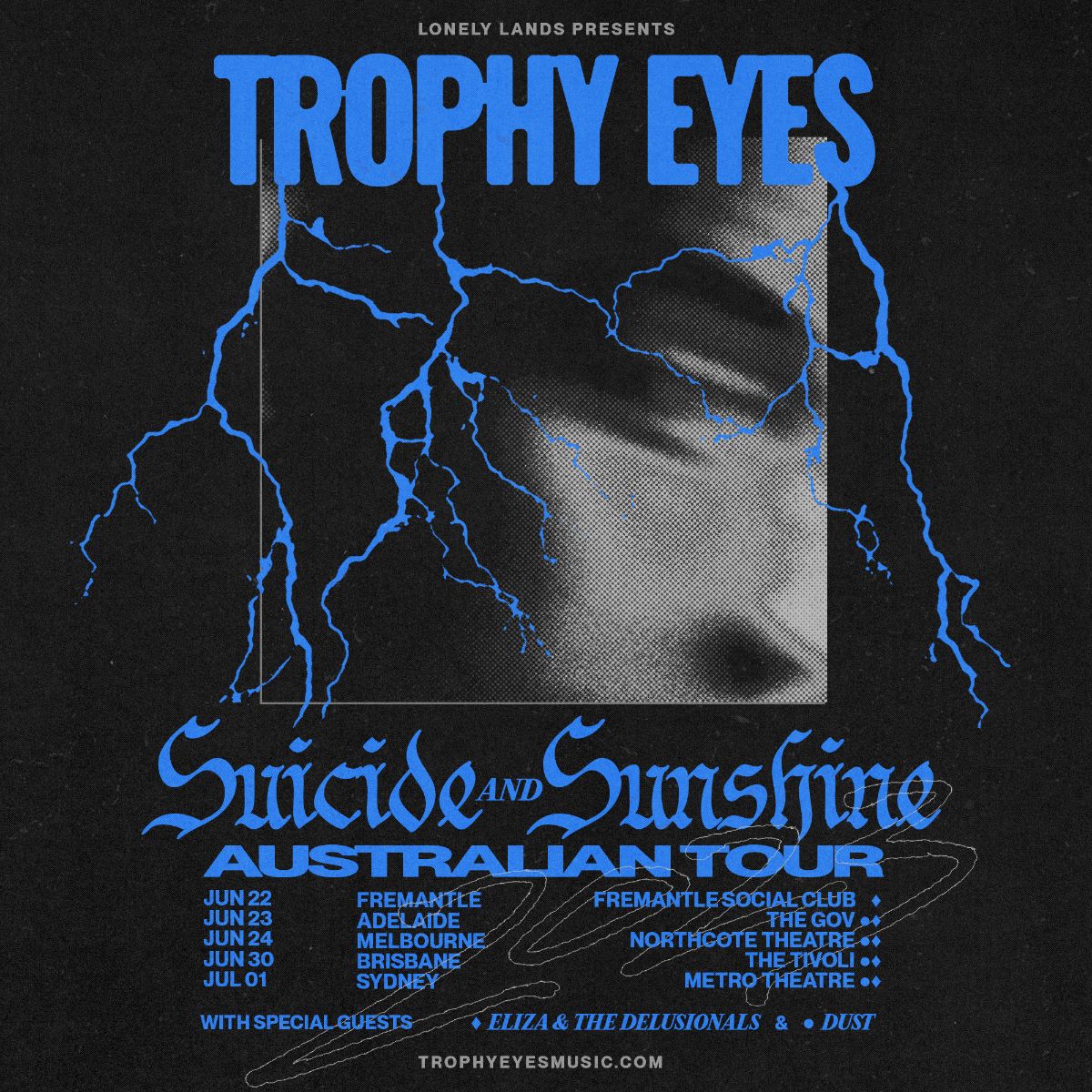
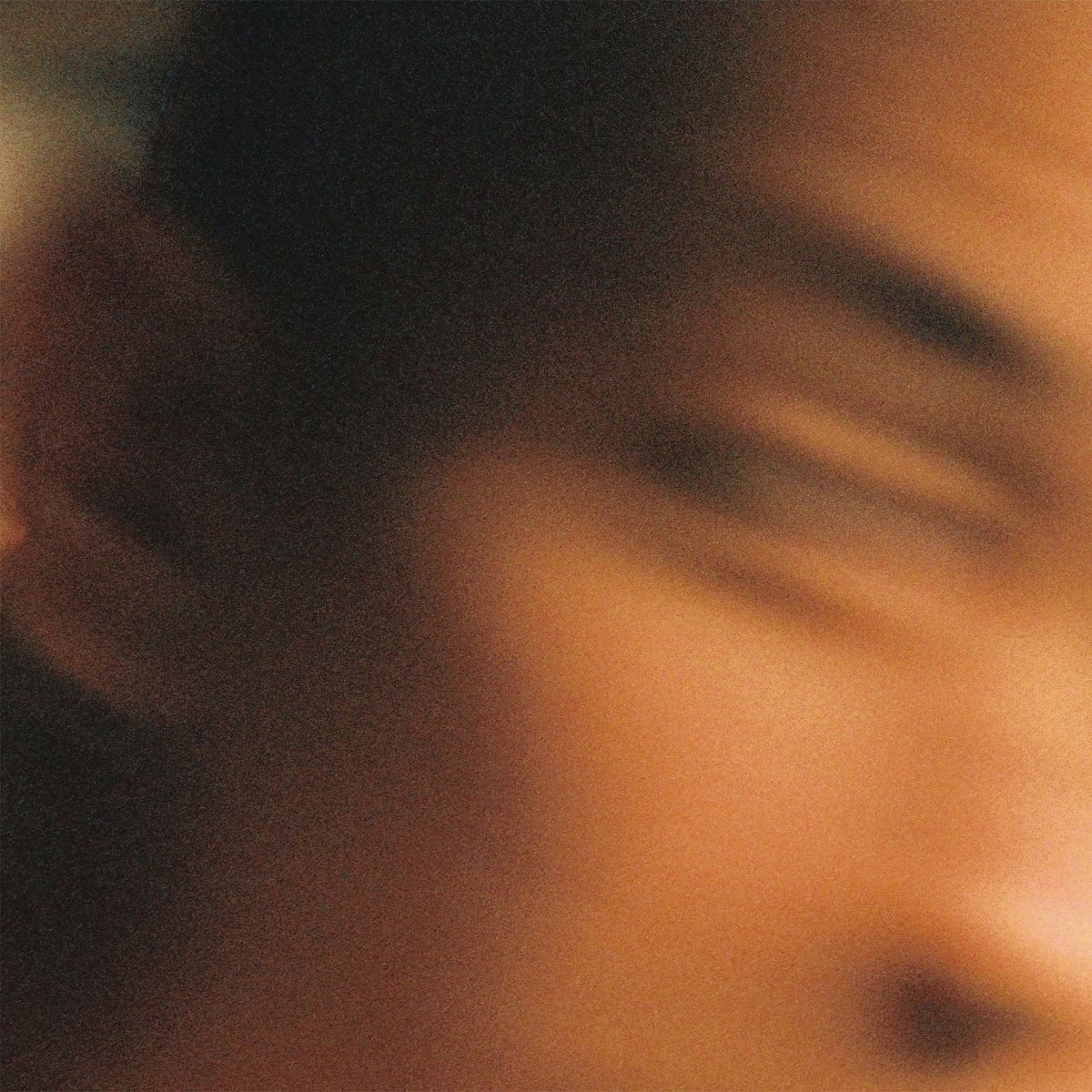
Listen to Suicide and Sunshine


